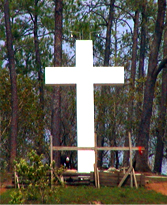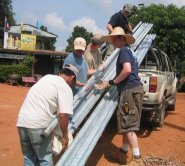Villanova Engineering Students Learn through Service

The College of Engineering’s students, faculty, and alumni exemplify the University’s Augustinian tradition of serving communities in need through service learning projects around the world. Villanova engineers work with people in those communities to design and build sustainable water systems, renewable energy systems, and buildings that support the communities.
In the processes of helping to create safe and healthy communities, students learn skills and develop insights that will stay with them throughout their lives. This provides an excellent opportunity to demonstrate the relevance of classroom and laboratory experiences within a real world context. Working with faculty and alumni advisors, students learn about construction techniques, project management, community relations, and working in an international environment. Because these are principally student-led programs, they develop leadership skills that will be critical as they begin professional careers.
In the past year, four programs – some newly formed, others with long track records of success, engaged the Villanova Engineering community in service projects: Amigos de Jesus Orphanage in Honduras, Water for Waslala in Nicaragua, Engineers without Borders in Thailand, and a senior design project in the Philippines.
Amigos de Jesus
The annual trip to Amigos de Jesus is a part of a service-learning course that is an outgrowth of the spring semester Senior Capstone Design Project in Structural Engineering. For the past seven years, students in that course have worked on various structural designs for a Catholic home for abused and abandoned boys in Honduras. Each Spring Break, a portion of the class has traveled to Honduras with the professors and a few CE underclassmen on an associated mission trip in which they work on the construction of those designs. The mission trip is co-sponsored by the Department of Civil & Environmental Engineering, the College of Engineering, and Campus Ministry. The trip incorporates all aspects of a service learning experience (preparation, service, reflection, and celebration).
This year's design project was a computer laboratory for an eight building school complex on the Amigos de Jesus site. The bilingual school will serve the children at Amigos de Jesus and the surrounding villages. Villanova students and faculty constructed the ten foundations for the building in March. To date, all eight buildings have been designed by students in the structural engineering capstone course over the past three years. Two buildings are operational and three others are under construction. To learn more about this service project, please check the following link.
Water for Waslala
The Water for Waslala program began in 2002 when a small group of Villanova students from different colleges on campus went to Waslala, Nicaragua, and saw the desperate need to design and support a system for bringing clean water to this poor community. They helped form a non-profit organization to support the project, and Villanovans have been going back every year since. During spring 2007 break, a College of Engineering team of faculty and students went to Waslala, where over the years since 2002 the College has been involved in bringing potable water into the homes of the residents of this remote town. This year, in addition to the engineers working on the water systems, a contingent of nursing students accompanied them to provide health services to the residents. For more information, please check: http://www.waterforwaslala.org

Engineers Without Borders
In the fall of 2006, three freshmen engineering students, Sarah Arscott, Jessie Minott, and Ashley Ferguson, formed a chapter of Engineers Without Borders (EWB), an international, non-profit organization that partners with communities worldwide to improve their quality of life. The organization involves professional and student engineers to design and build sustainable engineering projects in developing regions. In their first year the students recruited a chapter of approximately 30 members. They got off to a great start by partnering with an EWB professional chapter in New Orleans to create a play-space at Capdau Charter School, which had been damaged by the hurricanes the previous year. They successfully completed three service trips throughout the academic year, redesigning and helping to construct the play area.
As a result of its work in Louisiana, Villanova’s EWB was one of two chapters invited to make a presentation to a meeting of the Philadelphia-South Jersey regional chapter of the American Society of Civil Engineers (ASCE) in February 2007. Their presentation about the Capdau Playground project so impressed one of the members of the audience, who was also a member of the Project Management Institute of the Delaware Valley (PMI-DV), that she encouraged Villanova to apply for PMI-DV’s prestigious Project of the Year award. As a result, EWB was awarded an Honorable Mention for Project of the Year. EWB was the only student group recognized with an award by PMI. The other winners this year were project managers within private industry.
Building on the confidence and experience gained from the New Orleans project as well as attendance at a national EWB conference, the students identified an ambitious project for the spring and summer. This May three undergraduate engineering students – Ean Mulligan, Eric Baker, John Gunn – and their faculty advisor, Jordan Ermilio, along with a group of students from the University of Maryland, set out for the Lahu hill-tribe village of Pa Bong Mai in Northern Thailand. There they worked on a water distribution and treatment system that would transport and purify fresh water to an orphanage and village. Approximately 30 children reside in the orphanage and 35 families live in the village of Baan Bo Mai, which currently lacks safe drinking water.
Working with local community members, the team installed more than two kilometers of piping; rehabilitated the source intake structure; supported the pipeline with concrete anchors and steel cable; and constructed valve boxes, tapstands, and a reverse thrust block.
Villanova students also completed a site survey of two villages (Pa Bong Mai and Pa Bong Kaw) with the intention of completing the expansion of this system to serve an additional 500 residents. Villanova representatives also met with a number of engineering faculty members from Chang Mai University in Thailand to collaborate on possible research and monitoring of the water system and assisting Villanova’s EWB chapter in designing a water treatment facility for this area and in joining our team for the installation this January 2008.
Senior Capstone Project in the Philippines
In August a team of Villanova engineering undergraduate students assessed and evaluated renewable energy projects in rural areas of the Philippines. The Villanova team, which consisted of Michael Reilly, Edward Tilley, William Sturgis, William Martella, and their advisor, Jordan Ermilio received funding from Villanova’s undergraduate grants and awards committee to research micro-hydro electrification projects in the remote province of Ifugao, Philippines. The team partnered with a local non-governmental organization to evaluate existing rural electrification projects and assessed a number of new projects sites for development. During the process, Villanova students coordinated with the governor’s office in Ifugao as well as members of the country’s Department of Energy to learn about past and present efforts in developing renewable energy resources in the region. This design team plans on investigating existing micro-hydro turbine designs in the CEER laboratory to propose design changes to improve turbine efficiencies.
